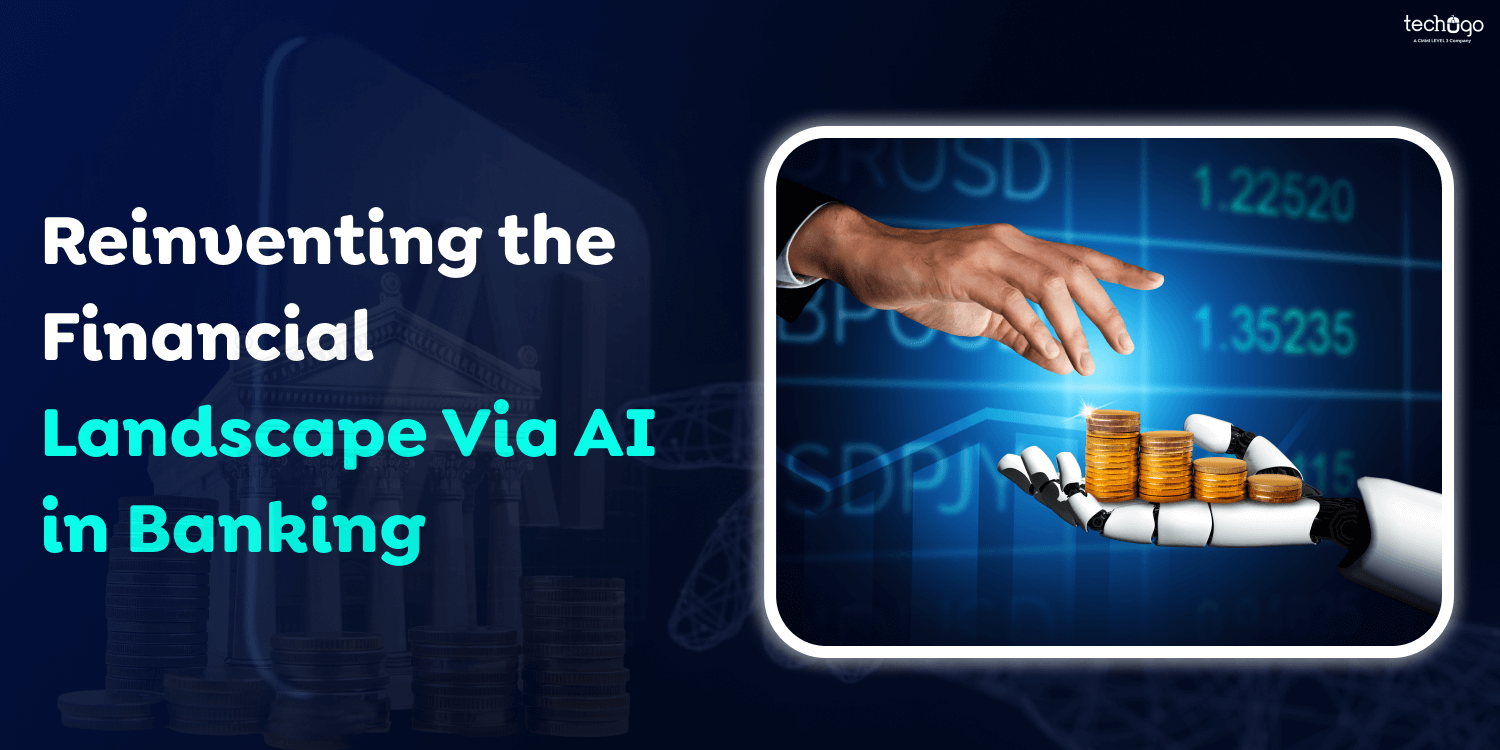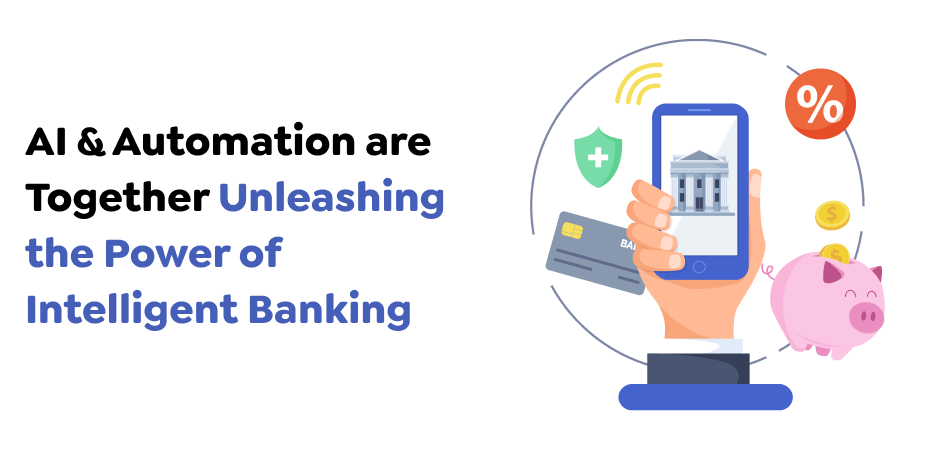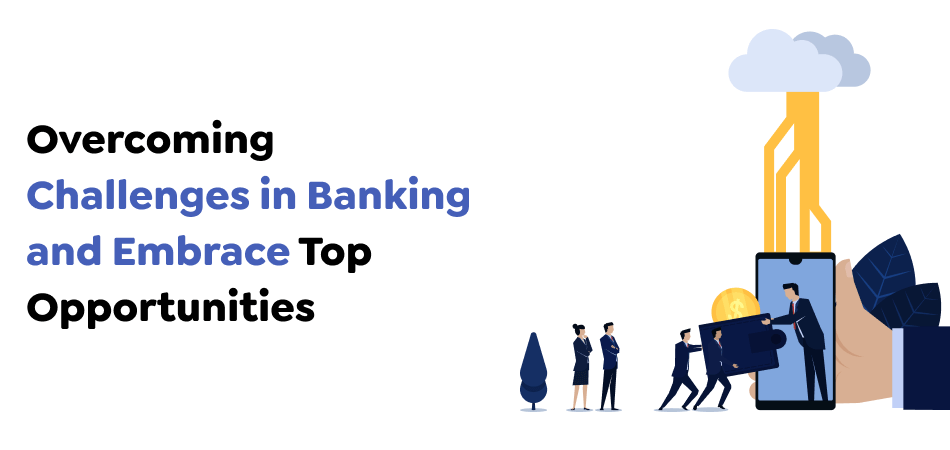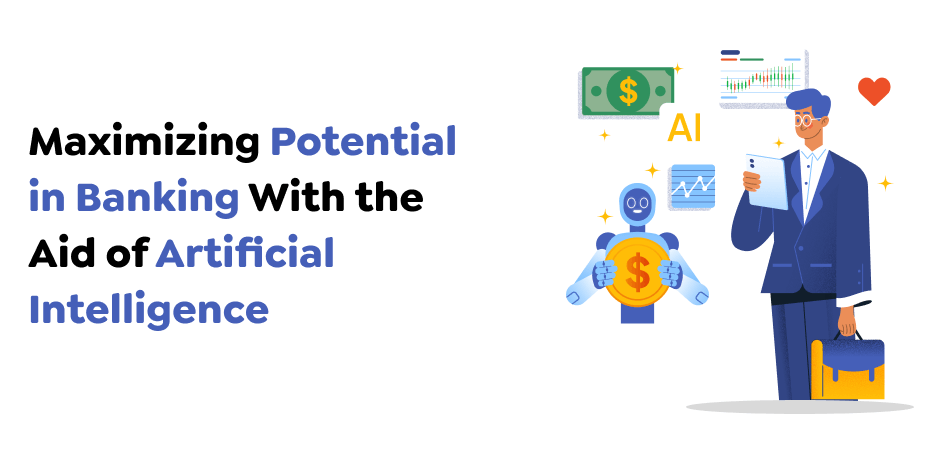Write Us
We are just a call away
[ LET’S TALK AI ]
X
Discover AI-
Powered Solutions
Get ready to explore cutting-edge AI technologies that can transform your workflow!


Artificial intelligence is an immensely powerful catalyst driving transformational shifts across various sectors. One area that is witnessing a significant change is the banking and finance sector. The days are gone when we need to schedule a time to visit the bank to finish procedures with banks to achieve particular goals. However, bank employees must also complete many papers and use mathematical, statistical, and logical equations for specific financial calculations.
Do you know that 80% of banks accept the immense benefits AI can bring to the banking industry? Another report is adamant about AI’s enormous growth potential in the finance and banking domain, forecasting that its value could be as high as $1 trillion.
The potential for AI and machine learning models (especially LLMs) and with the expertise of AI app development company, the banking industry will benefit from AI integration, particularly Generative AI with area-specific applications. For instance, many well-known automation tasks, such as customer service processing, data entry, and computations, require labor. Using AI generative, banks can improve their decisions, simplify processes, and provide customized customer experience.
Now the question arises how will AI shape itself within the banking industry? This blog will cover everything you need to be aware of the benefits of AI in banking.
AI is a field of computer science which focuses on creating smart machines that work and accomplish tasks exactly like humans. AI machines can learn, organize, and analyze data to develop predictions based on this data. AI is becoming a significant technology in banks. If used for internal processes and applications for customers, it will aid banks in improving the customer experience, detecting fraud, and managing investments and money.
To keep up with technological advancements, enhance their competitive edge, and provide superior service and improved customer experience, banks and financial service firms, such as banks, are embracing digital transformation. The introduction of AI technology has made digital transformation more crucial since it could transform businesses and decide which businesses are successful.

Traditionally, traditional financial services providers have needed help to bring innovation. Numerous emerging startups in banking are leading the way in artificial intelligence situations, which makes it imperative that banks keep up with the times and develop them.
Investment banking companies have long employed NLP to analyze the large amounts of information they collect internally or obtain from third-party sources. They utilize NLP to study information sets in order to make well-informed decisions regarding financial investments and wealth management.
The financial sector, particularly, is taking advantage of AI technology benefits. Customers want mobile banking app that allow them to find out more about the services, talk to people or virtual assistants, and improve their financial management. Businesses must improve their user experience to keep their clients satisfied. Implementing and using AI solutions can be one method to achieve this.
While AI has much power, pairing it with automation can unlock more significant potential. Automated by AI, it combines the wisdom of AI and combines it with the reliability of automation. For example, AI can enhance robotic process automation (RPA) to help better understand data analytics and then take action according to what the AI thinks is the most effective.
AI has become an integral component of today’s world as banks have implemented this technology in their services and products. Below are some of the significant use cases of AI in banking industry:

Fraud is always a huge problem for banks and other financial institutions. Each year, billions of dollars are lost to fraud like identity theft, fraud with credit cards as well as money laundering. Recently, AI has emerged as one of the effective methods to fight fraud. According to a recent study, about 58% of banks had reported extensive use of AI to detect fraud.
An improved knowledge of patterns that cause fraud allows machines to recognize suspicious activity more quickly. This results in faster identification and reduced fraud, which reduces the loss of funds that banks could suffer. A timely intervention could be cost-effective and secure the assets of the institution as well as the funds of customers.
Financial institutions and banks could be excited about automating credit check processing using AI algorithms. The algorithms can ingest vast data on customers, including credit histories, employment information, financial statements, and more. Using this information, they can quickly and precisely assess a person’s creditworthiness. The assessment involves determining credit scores based on the information gathered, which allows organizations to make informed loans quickly.
AI algorithms can also conduct an extensive risk assessment by identifying risks related to the person’s past financial records and behavior. It doesn’t matter if it does not recognize a record of insufficient payments, high credit levels, or even a loan default pattern. The algorithms can identify pertinent concerns. In addition, they eliminate the requirement for labor-intensive processing and data analysis, drastically cutting down on the amount of time and expense of traditional credit checks.
For the security of transactions, AI algorithms implemented by mobile app development company in UAE have a high success rate in the field of real-time pattern recognition as well as anomaly detection. They analyze transaction information to identify patterns that could indicate fraudulent activity. If, for instance, multiple transactions take place from various places in a short time, it may indicate an attempt to use an unauthorized credit card.
Additionally, AI algorithms watch spending patterns and can spot unexpected increases in expenditure or purchases from different categories that could be warning signs. Additionally, they look at the time-related aspects of transactions, such as timing, frequency, and place of purchase, to determine suspicious transactions.
Customers are always looking for more convenience and a better experience. ATMs were a success because customers had access to the essential benefits of making deposits and withdrawals without banks. The convenience of ATMs has sparked more creativity. Users can now access bank accounts from their homes with their mobile phones.
Integrating AI in banking and financial services sector increases the user experience and ease for customers. AI technology decreases the time required to collect Know Your Customer (KYC) details and eliminates mistakes. In addition, new products and financial deals are made available promptly.
AI can automate the eligibility requirements for situations like seeking personal loans or credit, so customers will not have to worry about going through the whole procedure manually. Additionally, AI-based software speeds up the approval process for services such as loan disbursement. AI in banking customer service can also help capture customers’ details to create accounts without error, ensuring customer satisfaction.
AI is also an excellent tool for managing portfolios of investments. It offers insight into portfolio performance and identifies risks that could be present. In particular, AI can identify stocks that are underperforming or overvalued. It allows investors to decide which stocks to buy or sell. AI can also suggest rebalancing portfolios or investment allocation to help investors reach their goals.
Also Read – Invest Smart: The Ultimate Guide to Crafting Winning Investment Apps
AI algorithms can identify potential investment opportunities by analyzing market data and finding undervalued stock markets or emerging trends. In particular, AI can analyze data from different sectors, determine firms with high growth prospects, and offer investment recommendations, including diversification or managing risk.
AI is the key to providing customized financial plans and suggestions. AI accomplishes this by meticulously analyzing a person’s financial information, including transaction history and income, expenditures, savings, investment, and other patterns. The data-driven method lets AI comprehensively comprehend the client’s financial position. Armed with this data, AI converses with the client to determine specific economic objectives. The goals are tailored according to each person’s particular circumstances and desires, whether you are saving money for buying a home and planning for retirement or investing in higher education.
Additionally, AI conducts a thorough risk assessment to determine the client’s investment confidence level. This vital information aids in shaping the recommendation and ensures that it aligns with the client’s level of risk aversion. AI develops individual investment strategies based on the goals established and risk profile. AI systems suggest investing strategies tailored to improve the client’s financial situation.
AI is crucial in analyzing customer behavior patterns in the financial and banking sector. It initially collects abundant information from various sources, such as transaction records, account balances, customer demographics, and online interactions. This information is compiled into one database, giving a complete overview of every customer’s financial situation. AI excels in detecting trends and patterns using advanced algorithms.
Also Read – Artificial Intelligence Trends That Will Change The Decade
It detects consistent behavior patterns, such as consistent billing, regular online shopping, or savings routines. This pattern recognition allows AI to understand individual spending habits and preferences better. AI systems can adapt when the data grows, improving understanding and forecasting. This constant process lets banks and financial institutions anticipate their customers’ needs to prevent fraud and improve customer service.
AI automated loan approval systems, which speed up the process of applying for loans. With this method, loan applicants can submit loan requests electronically, supplying vital financial data and details about their personal life. The system then analyzes and confirms the information from different sources, like income and credit reports, to ensure the authenticity of the information provided.
Mobile app development company in USA employs advanced algorithms to evaluate an applicant’s creditworthiness, considering factors such as financial history, credit scores, and debt-to-income ratio. The comprehensive risk assessment enables it to make educated loan decisions automatically, determining whether or not to approve a loan and modifying the terms of loans. It includes interest rates and repayment plans, ultimately streamlining the lending process for both the lender and borrower.
AI algorithms analyze market trends to spot patterns and provide insights. In particular, AI can identify patterns in the price of stocks and forecast the future, assisting investors in making educated decision-making about investments. It can fully understand market developments by studying the data gathered from different sources, including news or social media.
It can also analyze financial reports. The information it collects can assist investors in adapting their strategies for investing and reducing the risk of a potential catastrophe. For example, if AI forecasts a recession coming or recession, investors might move their investment portfolios to safer sectors to limit possible losses.
AI can also help in risk management by analyzing data from different sources, such as financial reports, news articles, and financial reports, and identifying possible risks. For example, AI can analyze news reports on a specific business or industry and pinpoint potential hazards, such as publicity or legal concerns.
Global factors external to the world, like currency movements, natural disasters, and political instability, can significantly impact the financial sectors. Making prudent business choices is essential when there is a high level of risk. AI in banking sector gives you insights from an analytical perspective that improve comprehension of future events and can aid in proactive preparation and prompt decision-making.
Analysis of competitors within the finance and banking sector helps institutions gain a competitive advantage through rapidly processing vast amounts of data. Machine learning algorithms evaluate competitors’ products’ market position, offerings, and consumer behavior, providing vital information. AI identifies latest trends and moods by analyzing news and social media sentiments. This allows banks to quickly adapt to changing market conditions. Data-driven decision-making improves creativity and helps organizations respond to competition dynamically through the fast-changing business creation of financial statements.
AI plays a more crucial role in automating reports for financial reporting in the financial industry. AI-powered systems can analyze massive financial data from various sources, streamlining the production of reports for business. Through AI in financial services, companies can gather relevant information, verify the accuracy of their data, and produce accurate and complete financial reports quickly.
An important AI application for finance is automating the reporting required by regulators, in which banks must abide by intricate regulations and then submit precise reports to regulators. AI implements this procedure by automating data extraction, performing calculations, and creating reports that comply with the rules.
AI models are crucial in predicting customer churn by analyzing customer behavior patterns to determine what customers will be churning in the coming months. With these data, banking institutions and banks can proactively identify at-risk customers and implement targeted measures to avoid customer churn.
Recognizing the factors that cause customer loss allows organizations to create a customized retention strategy to increase customer loyalty and improve customers’ lifetime value. Using AI-driven churn predictions, institutions can strengthen customer relationships, reduce churn rates, and improve their standing in the marketplace.
Robo-advisors are now gaining popularity as instruments for offering automated financial advice to customers. Virtual financial advisors use AI algorithms to handle portfolios of investments, providing personalized suggestions based on individual objectives and risk profiles.
Robo-advisors can manage portfolios and offer other services, like tax optimization, accessibility to advisors from human sources, and diversifying investment choices. With the help of AI platforms, the conventional wealth management business has been disrupted by offering affordable and accessible options for investing in a larger market.
AI effectively processes financial documents like receipts, statements, agreements, and other agreements, gaining critical insights and details from every document. AI helps automate the collection, interpretation, and processing of data contained within documents, significantly improving financial institutions’ efficiency, accuracy, and decision-making process.
Utilizing AI to process documents, companies can improve workflow, reduce manual labor to reduce errors, and gain actionable insights from complex financial information. Ultimately, this will enhance efficiency and facilitate strategic decisions.
It’s wonderful to hear you’re considering implementing AI advancement to improve your bank operations. But it’s not as straightforward as you think. Banks must analyze many issues, decide on various priorities, and identify the necessary skills to make this transformation available.

If your bank operates at a smaller or a large scale, regardless of size, each has a unique set of problems and objectives to be met. In the event of implementing AI in your bank, examine your institution’s technology, its information infrastructure, areas where it must be more focused, and AI capability. There should be a clear plan to implement AI, including optimizing operational efficiency, improving customer service, or reducing risks.
In some instances, you’re aware of the requirements of your bank for AI; however, you are unable to pinpoint them precisely. So, an ideal choice is to seek advice from experts in the industry who know the current banking environment and the latest technologies.
The decision to implement AI in banking apps is an important one that you’re making. When taking this step, you must consider long-term options and prepare your plan as a more enterprise-based AI strategy that is aligned with objectives and principles and in line with standard industry regulations. To do this, you must conduct thorough market research in the industry and institutional studies to identify opportunities to address the gaps in AI within finance.
Once you have decided on AI applications you want to incorporate at your bank, search for data scientists and ML engineers from a fintech app development company. Every individual will have various skills to aid you in determining the best-fit AI solution for your company. Data scientists can assist you with data pipelining, live streaming of data, warehouses, synthetic data generation, data modeling, and more. ML experts will help you design algorithms and create sophisticated models using data from data scientists.
AI developers can help combine machine learning and data science solutions and create comprehensive AI solutions. Selecting the best team for your needs is crucial, and it will require you to know what kind of expert you wish to include in your group, their values, and your budget priorities.
Next, you must engage your team to create a custom AI solution to meet your customers’ banking requirements. This involves building prototypes and testing functions and features to determine what solution will add the most value to your banking requirements.
In the initial testing phase, technical and bank teams must develop relevant datasets to help the algorithms react correctly and precisely. This is a continual procedure of retraining AI models to create an efficient solution for banks that need to improve their processes.
Developing an AI solution to help banks does not complete the task. It also requires installing specific monitoring methods, data privacy, and security measures in compliance with legal requirements. The banking industry is the most tightly regulated sector in addition to other industries, and it is required to adhere to stringent regulations in the financial sector based on nation, like the General Data Protection Regulation (GDPR).
Conformity with these standards is crucial for banks to safeguard the consumer, limit risks, and establish trust with the other stakeholders. The absence of compliance with rules could result in penalties from regulatory agencies, reputational damages, financial loss, and loss of trust from customers.

The broad implementation of advanced technology, such as AI, has been challenging. Banks using AI technology face many challenges, ranging from not understanding the cost to build a mobile app in the UAE, lack of trustworthy data to security concerns.
The volume of data banks collect is massive and requires sufficient security measures to prevent any breach or violation. Therefore, finding an appropriate technology partner who knows AI and banking and provides various security options to ensure that your client data is handled properly is essential.
Banks require structured and high-quality information for validation and training before deploying an AI-powered full-scale banking system. The data must be of high quality to ensure the algorithm can adapt to real-world scenarios.
If information is not available and accessible to machines, that could lead to unanticipated AI behaviors. Therefore, banks accelerating the implementation of AI must modify their data policy to minimize compliance and privacy risks.
AI-based systems can be used in making decisions since they can eliminate mistakes and help make it easier to work. They can, however, exhibit the mistakes of previous instances of human error. Small inconsistencies within AI models don’t take long to grow and lead to major issues, putting the bank at risk and its reputation and performance.
To prevent catastrophes, banks must provide appropriate explanations of all recommendations and decisions made by AI models. They must understand how the model works, verify it, and then explain what it does to make its decisions.
The effective integration of artificial intelligence within banking represents an essential transformation in the banking landscape. The use of AI technologies isn’t only a trend but an imperative requirement for banks to remain modern and competitive. AI-based banking provides unimaginable opportunities to innovate, increase efficiency, and personalize, changing how banks work and interact with their clients.
Also Read – How Artificial Intelligence Technology Could Help Fight Climate Change?
The path to implementing AI within banking can be multifaceted and requires a thorough evaluation of existing capabilities, a precise plan for AI integration, and the development of a roadmap to implement it. This transformation requires strong oversight and a robust spirit of change and flexibility.
In the face of difficulties and opportunities offered through AI, the secret to their success is finding the right compromise between technological innovation and the human perspective in which mobile app development company in Saudi Arabia can help you. Although AI can automate processes and improve information analysis, the human factor remains vital in areas that require the ability to judge, empathy, and personal interactions.
AI will influence the future of banking. The banks that adopt this latest technology and integrate it effectively into their business are in a good position to lead in the new age of banking marked by better customer experience efficiency, operational excellence, and new financial services. With time, AI in banking industry is expected to continue evolving and will open the door to better, more customer-centric, and more efficient banking methods.

AI has a revolutionary impact on the banking industry. From improving customer experience through chatbots to safeguarding your money from fraud, AI has changed how banks work. With time and the advancement of AI, collaboration of AI with blockchain technology could lead to further exciting innovations. Therefore, whether you’re checking your balance on your account, seeking financial advice, or even applying for loans, remember that AI is operating in the background to make banking more accessible and safer.
The future of AI in banking is full of potential. The constant advancement of AI technology is expected to propel more innovation in banking and allow banks to offer better services, increase efficiency, and be ahead of the curve in a constantly evolving digital world. Connect with a reputable AI app development company. They will help you integrate AI and help you understand the cost to develop a mobile app in Saudi Arabia.
Techugo, a leading AI app development company, is committed to revolutionizing the banking industry through cutting-edge AI solutions. With a proven track record of success and a team of skilled experts, Techugo offers comprehensive services tailored to meet your unique banking needs. From developing intelligent chatbots to implementing advanced fraud detection systems, Techugo’s expertise ensures seamless integration of AI into your existing infrastructure. By partnering with Techugo, you can unlock the full potential of AI, enhance customer satisfaction, and gain a competitive edge in the rapidly evolving digital landscape.
Get in touch with Techugo today!
Write Us
sales@techugo.comOr fill this form